Issue Number 26, Fall 2014
Contents
- The Snakes of September by Stanley Kunitz
- Carnivorous by Sally Molini
- Circle by Barbara Southard
- Conjoin by Michele Lent Hirsch
- Conservation by Scott Norton
- Exit 37B by Richard Jordan
- Feast Day, Lady of Sorrows by Diana Woodcock
- Pesticide Survivor by Diana Woodcock
- In the Drawing-Near Time by Dianna Henning
- Invitation by Ryan Bayless
- Ladder (5) by Grace Marie Grafton
- Lepidoptery by Amy Wright
- Letters from the Hinterland #10, Stuff by Raymond Greiner
- Murmuration by Sarah Fawn Montgomery
- Oil Plants by D. m Aderibigbe
- Prince Edward Sound by Richard Donnelly
- Roshoshona by Laura Budofsky Wisniewski
- The Honeybee Fears for the Future by Jeanne Wagner
- The Muskrat by Margot Farrington
- Whatever Powers by Caroline Sulzer
- Who Remembers by Elizabeth Herron
Archives: by Issue | by Author Name

The Snakes of September
by Stanley Kunitz
Stanley divided his time between New York City and Provincetown, Massachusetts. He enjoyed gardening and maintained one of the most impressive seaside gardens in Provincetown

All summer I heard them
rustling in the shrubbery,
outracing me from tier
to tier in my garden,
a whisper among the viburnums,
a signal flashed from the hedgerow,
a shadow pulsing
in the barberry thicket.
Now that the nights are chill
and the annuals spent,
I should have thought them gone,
in a torpor of blood
slipped to the nether world
before the sickle frost.
Not so. In the deceptive balm
of noon, as if defiant of the curse
that spoiled another garden,
these two appear on show
through a narrow slit
in the dense green brocade
of a north-country spruce,
dangling head-down, entwined
in a brazen love-knot.
I put out my hand and stroke
the fine, dry grit of their skins.
After all,
we are partners in this land,
co-signers of a covenant.
At my touch the wild
braid of creation
trembles.
© Stanley Kunitz
Carnivorous
by Sally Molini
Sally lives and writes near Heron Haven, a spring-fed wetlands sanctuary and one of the last ox-bow wetlands of Big Papillion Creek.

no more, if I had to
dispatch the creature or watch
someone else transform a chicken
into anonymous shrink-wrapped meat,
for dinner whole legs roasted with baby
Yukons, mushrooms and onions.
My TV tray all set as I tell Planet Earth
predators to stop chasing the caribou
and eat something leafy, as if they could
ignore the nature they’re driven by
on this sextillion-ton
self-absorbed orbit that feeds on itself,
nestled in its little cosmic spot,
doing the same things over and over.
At least I refuse to pick banded lobsters
from a tank, recalling the words of a monk
I know: the connection to the animal is less
when bought at a supermarket.
What earthling doesn’t want a happy life,
so many waiting in cages, pens, and corrals,
forkfuls of a bird I never knew
lifted to mouth as the grind
continues, the human mind as usual
feeding itself reasons.
© Sally Molini

Circle
by Barbara Southard
Barbara lives in the Northern Long Island Watershed in the hills leading down to Long Island Sound.

From far off, the gull looks like a mound
of feathers on the bitter-cold beach,
eyes so alive atop a pile of useless fluff,
alone at the edge of the sea,
tide rising, pushing him back and forth,
clouds racing by.
To be so utterly alone, yet so alive.
He looks up to watch his flock pass by,
sees one turn back, fly round in circles
calling out again and again.
Come up! Come!
She flies one last circle above his head,
wings beating against his ruin—
then away from his watching eyes,
gray feathers animated by white,
mirror to clouds above
darkness of pebbles on the shore.
© Barbara Southard

Conjoin
by Michele Lent Hirsch
Michele lives and writes between Brooklyn's Prospect Park Lake, scattered with at-risk ducks and geese, and the Gowanus Canal, a heavily polluted estuary.

There is a single clear pane between
the World’s Largest Reptile
and me.
A sign warns Please Don’t Tap
but you know each person here can imagine
the glass vanished entirely.
And what would happen in that moment,
in that terrible wonderful moment before
panic?
Charged air would spin and bounce between
two species — both muscle-tense,
both trembling —
and I wonder if the crocodile might rest a while
uncaged, watching only, seeing us
finally seeing him.
© Michele Lent Hirsch

Conservation
by Scott Norton
Scott lives on Redwood Shores Lagoon, at the base of the Belmont Creek watershed, in California. The manmade lagoon, on land "reclaimed" from San Francisco Bay wetlands in the 1960s to build an amusement park, now allows Scott to view 44 bird species (and counting) from his condo balcony.

They’ve created a small mountain in my name. At its base are the chassis of my old cars and appliances. The topsoil derives from a thousand hampers’ worth of my discarded clothing, shirts with one lost button, trousers with pocket holes. Now all that mulching cotton nourishes the roots of plants, while layers of polyester trap the rain in aquifers. Along the interpretive trail, I find my old futons and sofas recycled as park benches. The preserve boasts many splendors: a freon stream, a moraine of clamshell takeout containers, a lake iridescent with sunblock. This alkaline tufa of frothy white corrosion is a monument of all the batteries that have served me. Even the air tastes familiar, as if collected from the highway shoulder where I once hung a coffee filter for a school project, the paper disk blackening like our lungs. I’ll go as far as the next valley, which is verdant, I’m told, with loam enriched by half a century’s scrapings from my plate.
© Scott Norton
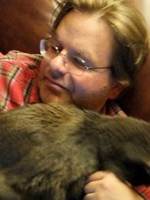
Exit 37B
by Richard Jordan
Richard lives in the Nashoba Valley in Eastern Massachusetts not far from the Nashua and Squannacook Rivers

The house stood near a widening of the creek.
It was gray, small, maybe fifty feet back
from the bulrush bed where pearl dace glittered
when the sun climbed high. A freeway overpass
now casts its shadow across that place. The bank
is choked with loosestrife. But I knew a woman
who lived there twenty years ago. I trimmed
her forsythia, planted peas & later worked
my line along a riffle on a day
when brook trout broke the surface at the suggestion
of a damselfly. We breaded the pink fillets:
cornmeal, salt, a drizzle or two of ale
& they tasted delicious, out there in the open.
Like spring, we thought, like nothing you could buy.
© Richard Jordan

Feast Day, Lady of Sorrows
by Diana Woodcock
Diana lives on the Qatari Peninsula, which lies on the northeasterly coast of the much grander Arabian Peninsula, surrounded on three sides by the Arabian (Persian) Gulf— poised perfectly between sea and desert.

For the cameraman, he waves a hand
over his parched land—all dust and wind,
not a tinge of green anywhere. He hasn’t seen
a harvest in two years, while across the border
poppies bloom—soon to seduce the West.
He’s sold his roof to buy food to feed his family
six weeks at best; he’s sent his smallest son
to rob the rat’s hole of its grain.
At this point I stop eating my bisque—
I can’t seem to swallow the shellfish.
I turn off the TV and sit in the dark on the
deck watching the waning Hunter’s Moon
rise above my gable roof, listening to
rasping crickets and the winds of war
as they spin out of control, wondering
what I’m willing to sell, who to rob
to endure the banishment from the garden.
All these repercussions: bloated stomachs;
glossed over eyes; roofless homes;
adolescent robbers of rats; parched
land; poor bone-dry Tajikistan.
Previously published in Swaying on the Elephant's Shoulders, Little Red Tree Publishing, 2010
Camel photo by Fay Gotting.
© Diana Woodcock

Pesticide Survivor
by Diana Woodcock
Diana lives on the Qatari Peninsula, which lies on the northeasterly coast of the much grander Arabian Peninsula, surrounded on three sides by the Arabian (Persian) Gulf— poised perfectly between sea and desert.

An osprey watches me
from a high branch of the birch,
perched above the escarpment
beside the rushing river.
We keep still together,
neither disturbing the other.
Two red-headed woodpeckers
chatter incessantly while storing
nuts and acorns in dead tree
crevices. A bluebird passes by
like a sapphire flung from its setting.
When the shot rings out
on the opposite shore, we all four
flinch. My goal now: to leave
this earth without disturbing
a single blossom of clover.
Previously published in Creative Juices, August 2002 and Swaying on the Elephant's Shoulders, Little Red Tree Publishing, 2010
© Diana Woodcock

In the Drawing-Near Time
by Dianna Henning
Dianna lives in the Honey-Eagle Lakes Watershed, which is bordered by the Skedaddle Mountains. Because of California's drought, the Skedaddles are no longer mirrored in Honey Lake.

The deer have been down to the graveyard to check
on the dead.
They can’t help their wistful watch. This time they brought
along their young.
Each deer is always last year’s fawn. No telling them apart.
Dead
or not. When I walk my dog and the struck doe beside the
road reeks
of death, my malamute fights her leash to rip free, and the
turkey buzzards,
like hunched priests, line the telephone-poles to wait for
us to pass.
I think of the graves the deer frequent—hedges, rose
bushes tastier
than bitter-brush. Already, it makes me cold to think of winter’s impending arrival;
how Pine Street slick with ice and snow buries the visible,
while the stationary flight of memory’s ripe birds take wing, fly south.
© Dianna Henning

Invitation
by Ryan Bayless
Ryan splits his time between his home in the Hill Country of central Texas' Edwards Plateau and his 1966 Airstream trailer perched atop an isolated ridge deep in the Davis Mountains of West Texas.

Beyond a gold-green meadow,
past stands of spruce and fir,
a blue-gray mist rises around Sheep Mountain.
The air, water-heavy. No wind.
I watch the landscape patiently
as birds find their way to trees.
On one side of the meadow, a lone deer
grazes on fresh grass, but when I turn to see her
she is gone. Just then, the thunder
shakes loose the rain around me
as if it had been waiting all along
for a sign.
© Ryan Bayless
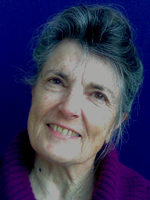
Ladder (5)
by Grace Marie Grafton
Grace lives in the wooded hills of Oakland, California, in the Sausal Creek watershed. Outside her kitchen door is a second growth redwood tree, part of a landscape that was blanketed with old-growth redwoods at the time of the California gold rush, and a short walk east from her house is the wilderness area of Redwood Regional Park, where she loves to hike.

Cannot say the honeybee is unaware. If it had no
consciousness, it wouldn’t distinguish between
a steel pipe and a flower. A specific flower, the choice
one having a perching petal or open face, a place where
the antennae, followed by the whole round body, enter.
We live in the galaxy we’ve named the Milky Way.
We need no place to enter, we’re an integral progenitor
of the atmosphere that holds our bodies here
in our home, held by gravity, contributing to gravity.
We slip easily in and out of the ubiquitous breath.
Our science describes how the honeybee telegraphs
the flower-field’s location to the rest of the group.
It drums on the outside of the hive. Drums like humans
have drummed and tapped into electric webs,
signals that circumnavigate our galactic iota.
Tapping, a message our bodies respond to. The place
in the womb, Mother’s blood-beat. We continue in that
sound to make our world. Child runs bump bump bump,
doesn’t walk. When we wish to woo, we use
rhumba, fox trot, one-two-three slide of the waltz.
We lift our arms, drop our gaze, enter embrace, approach
another’s heart. If this is the right one (does his heart fit
mine?) we raise our gaze and there, in the eyes, the place
to go in. We say, “Stars in her eyes,” galactic connection,
we begin to beat with our feet, here is the field of flowers.
© Grace Marie Grafton

Lepidoptery
by Amy Wright
Amy lives at the crossing of the watersheds for the Lower Cumberland and the Red. Once a year, she participates in a water ceremony similar to the intermingling of voices on Canary, where friends pour water from their summer travels into a clear bowl to celebrate coming together after venturing apart

Grandfather, auto mechanic, lepidopterist
in the posture of upright fence, Tom
peers into oak groves.
Plain clothed, no blaze orange earflaps
outfit him for this encounter
with the annual emergence of buck moths.
Hunting season though he bears a long-handled
butterfly net and permission from a local farmer
in lieu of a license, a rifle.
After working all his life with his hands,
he knows where to hold the thorax
to relax these downy puppies, keep their crushed
velvet scales perfect as a layer of baklava.
What he wants now, a not-yet retired man,
his blue Ford parked by the roadside,
is to breed a female. He looks far-off
with a fisherman’s patience, sighting the distance
for a falling leaf to come alive, beeline
behind him where a gravy-tailed egg layer
is calling, knowing a fleck will break free
from the hard
woods, flit toward him waiting
with a forked twig in a fastfood bag,
his little golden years luxury.
© Amy Wright
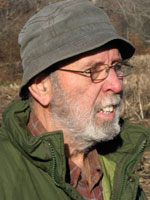
Letters from the Hinterland #10, Stuff
by Raymond Greiner
Raymond lives with his canine companions Orion and Venus on 14 acres of remote forested and pasture land about three miles from the hamlet of Paragon, Indiana, in a cabin about 500 yards from the little-traveled road.

I have been inventorying my stuff. I have de-junked a few times in my lifetime, but the stuff seems to have a life of its own. As I sort through boxes and clothing, I am reminded of Peace Pilgrim's sagacious advice, "Unnecessary possessions are unnecessary burdens. It is those that have enough but not too much who are the happiest." Seems to ring with a certain clarity.
The sorting and grading of what to keep and what to discard is a bit of a challenge. Things that were once important and desired now collect dust and occupy space. There is a certain attachment because at one time this item or that item added something to that time of my life. However, the pile of questionable worth is quite large and something must be done. Goodwill, Salvation Army, brush burning pile, and dumpster are options that need to be considered.
We Americans are likely the world's champion accumulators. Garages so full the door barely closes. In most communities there are multiple storage rental businesses filled with things that people have accumulated. In the nearby town of Paragon, week-ends are de-junk days, also called "yard sale" or "garage sale" days. You buy my junk and then you can sell your junk next week-end. Not sure if this is re-cycling or just plain old cycling.
My daughter's house has every imaginable kitchen device: three TV's (one a high-end flat screen technological marvel), humidifiers, electric space heaters, motorized foot massager, electronic alarm system, big screen Mac computer, high tech scale that measures weight and body fat (how does it do that?) and very sophisticated washer and dryer that confused me so much I now go to the Laundromat (much simpler and I don’t have to worry about whether I programmed all the options correctly.) I think my daughter’s household is representative of many American homes.
I wish every American could take two hours of their precious time and sit in front of their flat screen wonder to watch the documentary film The End of Poverty? Think again. Such a powerful film depicting the vast abyss between the extreme poverty and desperation of some and the rampant consumerism of others. As I think of the throngs of consumers I watched yesterday filing through the doors of Walmart, I think of this film, and I feel a mixture of sadness, guilt and disgust. Here I am in a quandary regarding what to keep and what to discard, and feeling very American in the process.
As I think of Peace Pilgrim’s words, "It is those that have enough but not too much who are happiest," I have visions of those millions of people in third world countries who don't have nearly enough. There is no "enough list," and as I listen to the political lexicon that centers on economic growth, escalating prosperity so the accumulation can not only continue but increase, it pushes a big question mark button. Are we on track? Are we meandering in a dismal swamp of glut? Do we know it? Do we care? Where are the answers? It seems like we, as a country, are plagued with an inability to view the total picture. Of course we need to drive toward economic growth and development; however, it would better balance our lives if we could gear our personal consumption toward less instead of more. If only we could stop and seriously evaluate our actual needs and then orient what we consume sanely instead of giving in to the hype, which is by design created to stimulate impulsive consumption.
Temperature dropped last night. I lit the wood stove. Orion's bed is near the stove, Venus's bed is at the foot of my mine. Dogs don't accumulate, although Orion is quite attached to his frisbee. Wish I were a dog.
© Raymond Greiner

Murmuration
by Sarah Fawn Montgomery
Sarah lives on the Great Plains in Lincoln, Nebraska.

Today the frost on the windshield is barely there,
like tiny birds’ footprints, dainty and forked,
or the V’s of flight in a child’s drawing.
I don’t scrape the ice, just ease onto the busy street,
flashes of a hundred headlights stark
against the glittering morning as folks rush
to work, hunched against their steering wheels,
and the cold, and the dull of Monday morning.
I pause at a crowded intersection, cars stopped
as people avoid eye contact and wait their turn
to turn away from one another. The frost figures
on the glass float over my sight as I turn the car.
They look like a murmuration—a thousand starlings
synchronized in the sky, undulating waves like a scarf
above the Plains, coming together and swaying apart,
soft like wheat or sorghum until the mass moves
overhead and the rapid rustle of wings reveals
the force it takes to keep this thing precise, pristine,
moving on a dime, a collective body, warm and beating,
each knowing in an instant where the other is going.
We move as one—the bird-ice and me—rhythmic,
turning together like dance, waltzing through town
until the crystals begin to melt, muddy the window,
and I arrive at work, stop the car, leave them to the sun.
© Sarah Fawn Montgomery

Oil Plants
by D. m Aderibigbe
D. m lives on a plot of land with his grandmother and a few family members in the Nigerian city of Lagos -about 300 feet away from the Majidun River in the Majidun River watershed.

After the Niger Delta Crisis
Our hearts stopped beating -- fear died --
because our teachers told us we had
to die for the classes to continue.
Because our fathers returned home
with slim fish nets, dripping of
their new glory – water -- crying over their
new roles: irresponsible fathers.
Because of our markets, now dumb as a
graveyard at night -- what do we call
a market with no things to sell?
We honed our machetes until their
teeth shone, like the brightness our
future lacked. We filled our wooden
guns with bullets, wrapped them
in our frustrations, headed
for the foreigners' oil plants that had
filled our breath with toxic smoke,
our rivers, deserts, under flowing
water with sparkling oil waste.
How does our future
grow older without these dead fishes?
When they ask us where we are
headed, we will tell them we are
going to get death, dead.
When they ask us where we are
headed, we will tell them we are
going to bring back our fishes.
*The Niger Delta is an oil-rich region in Nigeria, suffering from environmental issues as a direct consequence of oil exploration carried out by foreign nationals. This resulted in an uproar by the local people, who bear the brunt of these hazardous activities.
© D. m Aderibigbe

Prince Edward Sound
by Richard Donnelly
Richard finds solace in the beautiful creek and bluff country of Southeast Minnesota.

The best boat for Alaska is
the Hewes welded aluminum Pacific Explorer
where they fish from an eight
foot wide flat deck with
a self-draining cockpit and
two diaphragm floor boxes and on
off-days they are running
Prince Edward Sound to
deliver fifty pounds of potatoes
and two hundred of moose meat
to cabins on Kodiak Island
where stout-legged and wind-burned men
and women fish and camp
hunt and drink beneath the mountains
glaciers and sky the cobalt sea
crashing the seabirds crying in
a madness of multi-colored
days with more equipment better tools
a free hand at
ice granite gold oil sky
all of us living living living
until we die
© Richard Donnelly
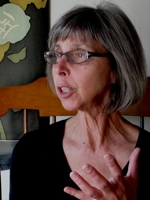
Roshoshona
by Laura Budofsky Wisniewski
Laura lives in the central Lake Champlain Valley, in the Lewis Creek Watershed, a lovely little tributary of which runs through her land. The plants and wildlife of Lewis Creek are currently being threatened by a drastic rise in housing and commercial development.

birthday of the world.
golden ginger, macoun, early mac
birthday of apples.
of cinamon, cardomom, vanilla, clove.
there is
an opening in the darkness through which we crown.
the leaves of maple, beech, silver birch
wash us with their turning
as the white-footed mouse licks her blind baby clean.
you can ask forgiveness of
brother, sister, lost children wandering, beautiful lover,
the dead.
you can ask forgiveness of god
almighty, merciful, wrathful, impotent, human.
wronged, bleeding, mute
that offers
chrysanthemum, marjoram, sweet grass, wild carrot.
the things
not the names.
© Laura Budofsky Wisniewski
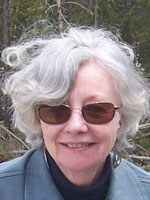
The Honeybee Fears for the Future
...honeybees were found capable of pessimism.
from "Findings," Harper’s Magazine
by Jeanne Wagner
Jeanne lives on the east side of San Francisco Bay with Cerrito Creek, and the canyon it forms, in her "backyard," where black-tailed deer, turkey vultures and a dwindling population of raccoon and possum still roam.

Sisters, I see it coming.
No more bustle on the stoop,
no more tremble dance or pheromone kiss.
Gone the pollen sacs and lacy wings,
swipe of petal and graze
of golden talc against our sides.
Even the flowers will be forgotten:
the blowsy fuchsias and blue hyssop, the miles
of milkweed and lavender, their nectar
the sweet currency of our lives.
Sisters, who will remember the larvae,
how even in the dark the wax around them
felt warm and lit from within,
how we spoke of honey with our whole bodies,
how we swaggered,
how asking where was enough?
Previously published in Posse Review.
© Jeanne Wagner
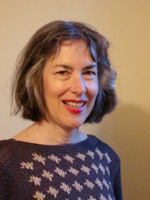
The Muskrat
by Margot Farrington
Margot lives in Williamsburg, Brooklyn, two blocks from the tidal sweep of the East River--a major flyway for migratory birds.

While I stood watching, the water began to well,
yielding up circle after circle, and presently
the sorcerer rose sleekly from beneath
and broke the surface. Not the end of the spell
but the outset, beguiled by the way the dark
head plied the blacker surface and the back’s
bit of island followed wherever it led. From the
bank above, I spied down. I had embarked
without knowing upon my own erasure. Gone
into ripples ringing outward. Dipped in bliss.
Water like ink held me in a world unwritten.
The buoyant one shimmered and shone.
Previously published in BigCityLit, and in Scanning For Tigers, Free Scholar Press, 2014.
© Margot Farrington

Whatever Powers
by Caroline Sulzer
Caroline lives in coastal Maine, within walking distance of Patten Bay, on a small wooded peninsula in the town of Surry, which is part of the Maine Coastal watershed.

All summer and fall I read
slowly and did not finish
a book about a small bird.
I know how it ends.
And so like whatever powers
chose NASA as the winner
of that marshland
once the sparrow’s
I open other tomes
new twists of plot
drawn to the unknown
so as not to land
at the Dusky’s end.
Still, the turn of any page
this morning sounds
a lot like a bird not singing.
© Caroline Sulzer
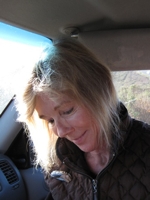
Who Remembers
Here is the song of the neglected yellow moon.
Jack Crimmins
by Elizabeth Herron
Elizabeth lives in the Atascadero Creek watershed, twin to the Laguna Watershed, both tributaries to the Russian River in Sonoma County, California, where salmon spawn and where coyotes and black-tailed deer are among her closest neighbors.

Where are the old songs,
the ones we lost
when we forgot our earth home?
If we listen could we hear them now?
Stones beneath the hawthorn,
rounded and whaled up
amid the sea of yellow leaves.
Who remembers the songs of stones,
their river, or the sea?
From the far creek – pale alder, yellow willow,
red-stemmed dogwood in autumn color.
From the open meadow, valley oak.
Who remembers their songs?
Who are we that we have forgotten so much?
If we listen deep into the world,
would we remember?
Canada geese at dusk
fly home to the wetland
ecstatically honking.
Heart by wing, they know,
where they belong.
If we listen, what forgotten songs
would we hear? What lost wings, what
ancient stones, what open branches
would welcome us home?
© Elizabeth Herron